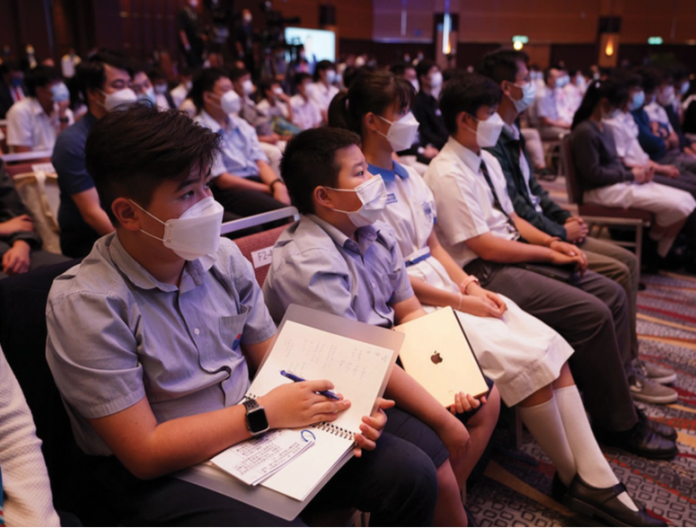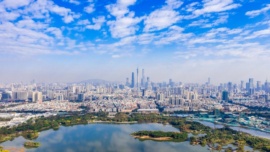Macau Business | December 2021 | Special Report | Macau’s ageing society
The demographic challenges Macau faces are not limited to that growing elderly segment crowning a top-heavy population pyramid.
Much less present in the front line of priorities is dealing with the effects of falling birth rates on the younger segment of society.
For example: how to train high-quality talent, when Macau is already suffering the effects of the birth crash that started 20 years ago?
A cohort of 3,000 graduating high school students means that fewer than 3,000 residents will enter the workforce in a year.
Sculpting the considerable number of high-quality talents required from raw material of less than 3,000 graduates is a very difficult task, one compounded by the significant number of young people going abroad to study but also compensated by university students arriving from the Mainland.
Accordingly, in 2020 the Government announced its intention to introduce a business model associated with higher education, looking for the idea of self-sustainability in local universities.
This decision to “industrialize” higher education, or “the commodification” of university degrees, should be seen as a response to the current demographic situation, since the small size of the student population translates to a higher cost per capita.
Forecasts indicate that only in 2030 will the number of secondary school graduates return to a normal standard of around 7,000.
The older society becomes, the more pressure there will be on young people to have more children – even against their will, or do you think we won’t reach that point?
Associate Professor Tianji Cai believes “generational pressure could be an influential factor, but won’t be a major driving force. Many young people leave their hometown to pursue better education and job opportunities. Fewer young people choose to live with their parents for multiple reasons such as housing conditions, financial concerns, etc. The cost of living is still increasing in major urban regions, especially for childcare. Therefore,” the Macau-based sociologist tells Macau Business, “unless the older generation can provide substantial support for childbearing, the fertility rate will keep dropping.”
Who are they (these youngsters)?
While “adolescents in Hong Kong grow up under constant pressure to be competitive within an increasingly limited economy,” their counterparts in Macau “can expect to have a more comfortable time in the future,” a Hong Kong study from five years ago claims.
Its authors, Wong and Chui, in an effort to understand “how a child’s well-being is affected by the wider economic conditions,” write: “This crucial difference is hypothesized to be responsible for the observation that older adolescents in Macau are associated with higher hope and purpose in life, while the same cannot be said for those in Hong Kong.”
Macau’s financial health and robust employment contributed to this (pre-Covid) difference between the two special regions.
But the flip side is in plain sight.
A recent survey carried out by the Macau Women’s Association found that around 53 per cent of young parents (between 31 and 37 years of age) admit to “ignoring” or taking an “indifferent” attitude towards their children’s education.
According to the study, it has become increasingly common to transfer the responsibility of children’s education to tutoring centres, maids or even mobile phones.
“Currently, as families in Macau are mainly made up of working parents, the family life model is often limited by living conditions. For example, parents are always busy with work or have shift-work roles, leading to diminished participation in children’s growth. Little by little, the need for communication between family members is ignored. In this context, the functions of the family are weakened”, the authors of the survey warned.
This finding led a group of researchers from City University of Hong Kong to evaluate the Family Dynamic and Antisocial Adolescents in Macau(2020).
Results of the study suggest “that family violence and parent–adolescent conflict are correlated with adolescent antisocial behaviour. Moreover, both instrumental and emotional support from parents can moderate the effect of family conflict on adolescents’ antisocial behaviour.”
The team led by Andrew Low concluded that “in view of the long and unstable working hours of parents employed in a gambling city, social workers in Macau should develop more innovative programs to support parents in Macau.”
This year, the results of a survey on the resilience of Macau’s youth, promoted by the Sheng Kung Hui Social Services Coordinating Office, were announced.
According to reports, more than half of the (600) adolescents surveyed need to be monitored due to depression, anxiety and pressure problems.
The physical and mental health of students in Macau has not gone unnoticed by the United Nations (UN), particularly regarding the increase in suicide cases. The topic was part of a recent list of concerns issued by the UN Committee on Economic, Social and Cultural Rights.
Special Report | Macau’s ageing society – Previous – 1,100 waiting
























